 Back to resources
Back to resources
Mental wellbeing while staying at home
Taking care of your mind as well as your body is really important when you're at home - whether that's because you're working from home, self isolating or any other reason.
-
Across Lambeth
-
11 Steps

-
Topics
- 1. Introduction
- 2. Check your employment and benefits rights
- 3. Plan practical things
- 4. Stay connected to others
- 5. Talk about your worries
- 6. Look after your body
- 7. Stay on top of difficult feelings
- 8. Do not stay glued to the news
- 9. Carry on doing things you enjoy
- 10. Take time to relax
- 11. Get good sleep
Introduction
You may feel worried or anxious about your finances or job, your health or those close to you. Perhaps you feel bored, frustrated or lonely. It's important to remember that it's OK to feel this way and that everyone reacts differently.
There are things you can do now to help you keep on top of your mental wellbeing and cope with how you may feel if you're staying at home. Make sure you get further support if you feel you need it.
Check your employment and benefits rights
You may be worried about work and money while you have to stay home – which can have a big effect on your mental health.
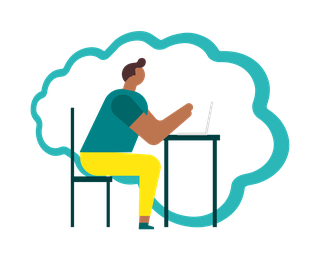
If you have not already, you might want to talk with your employer. Find out about government support for businesses and self-employed people and understand your sick pay and benefits rights.
Knowing the details about what the coronavirus outbreak means for you (England and Wales only) can reduce worry and help you feel more in control.
Plan practical things
If you're unable to get to the shops, work out how you can get any household supplies you need. You could try asking neighbours or family friends, or find a delivery service.
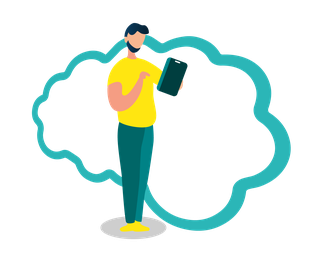
Continue accessing treatment and support for any existing physical or mental health problems where possible. Let services know you are staying at home, and discuss how to continue receiving support.
If you need regular medicine, you might be able to order repeat prescriptions by phone, or online via a website or app. Contact your GP and ask if they offer this. You can also ask your pharmacy about getting your medicine delivered, or ask someone else to collect it for you.
If you support or care for others, either in your home or by visiting them regularly, think about who can help out while you are staying at home. Let your local authority (England, Scotland and Wales only) know if you provide care or support someone you do not live with. Carers UK has further advice on creating a contingency plan.
Stay connected to others

Maintaining healthy relationships with people you trust is important for your mental wellbeing.
Think about ways to stay in touch with friends and family try:
- Pick up the phone and give a family member or friends a call. Whether it's the people you're closest too, or maybe it's someone you haven't spoken to in a while, your call could also make someone else's day.
- Use technology to video call your loved ones, try Skype, Zoom, Facebook Messenger or other video calling apps to connect with others. You could host a movie night, Sunday supper or Happy Hour, there's lots of fun ways to stay connected.
- Join interactive discussion groups online, try connecting with others through our groups page and find people with common interests.
- Volunteer with community support groups for outreach calls, either over the phone or safely in person, to support others who are not socially connected. Look at our volunteering page for opportunities, or visit the Team Lambeth website to see local volunteering opportunities.
- Hang out in your garden and interact with your neighbours, have a chat over the fence and be a friendly face in the neighbourhood.
Talk about your worries

It's normal to feel a bit worried or frustrated if you need to self-isolate. Remember: it's OK to share your concerns with others you trust – opening up about the way you feel can really help.
If you cannot speak to someone you know or if doing so has not helped, there are plenty of helplines you can try instead.
Look after your body
Our physical health has a big impact on how we feel. If you are self isolating, it can be easy to fall into unhealthy patterns of behaviour that end up making you feel worse.
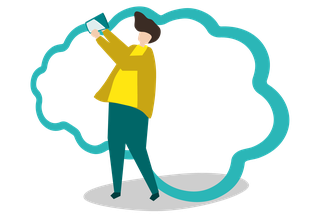
Eat Healthy
Try to eat healthy, well-balanced meals and drink enough water. BBC Good Food has loads of tasty, healthy recipes that you can try. Alternatively, check out our guide on how to eat well for less.
Avoid Unhealthy Habits
Avoid smoking, drugs or drinking too much alcohol. It can be easy to fall into unhealthy habits, but it's important to look after your health and not rely on smoking, drinks and drugs. You can replace your unhealthy habits with new healthy ones. For example:
- Instead of watching TV before bed, write in a journal! It's a great way to reflect on the day and how you feel
- Instead of scrolling on your phone, read a book. Escape to Tate South Lambeth Library and pick up a book to read
- Instead of sitting on the couch after dinner, go for a walk - whether its a short 5 minute walk or an hour, both can help! Larkhall park has an easy quick loop if you're short on time
- Instead of snacking on junk food, have fruit around the house! It's much healthier and just as delicious.
Importantly, tackle one unhealthy habit at a time. Trying to do too much at once can make it difficult to know where to begin, and you're less likely to make a change.
Exercising
If you are staying at home, you could try exercising indoors, as there are lots of free online classes. Or try an easy 10-minute home workout. Joe Wicks the body coach has fun at home workouts which are suitable for the whole family, find them free on Youtube here. For more hints and tips on how to keep fit whilst at home, access our getting active guide.
Stay on top of difficult feelings
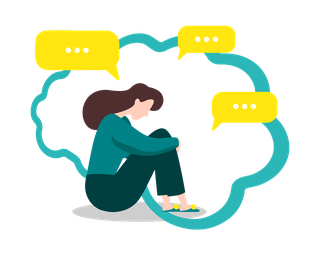
Concern about COVID-19 and your health is normal. However, some people may experience intense anxiety that can affect their day-to-day life.
Try to focus on the things you can control, such as how you act, who you speak to and where you get information from.
It's fine to acknowledge that some things are outside of your control, but if constant thoughts about the situation are making you feel anxious or overwhelmed, try some ideas to help manage your anxiety.
Allow yourself to feel emotion
Aim for regulation not suppression. When you suppress or repress, you’re preventing yourself from experiencing and expressing feelings. This can happen consciously (suppression) or unconsciously (repression).1
Identify your emotion
If you're feeling overwhelmed with emotion, take a pause and try to identify exactly what it is you're feeling so you can take control of the situation. Stop and think:
What am I feeling? What has caused me to feel this way?
Does the situation have a different explanation that might make sense? Is it a situation I can control?
What do I want to do about these feelings? Can I cope with them in a better way?
By identifying and reframing your emotions, you can modify your reaction to situations and cope with them better. 2
Keep a mood journal
Journalling works best when you do it daily, and can be a great tool to acknowledge and process how you are feeling and help uncover destructive patterns. If there are common triggers causing you to have negative emotions, you can work to manage them more productively.
Meditation
If journalling isn't for you, give meditation a try. Meditation can help you increase your awareness of all feelings and experiences. When you meditate, you’re teaching yourself to sit with those feelings, to notice them without judging yourself or attempting to change them or make them go away. 3
Do not stay glued to the news
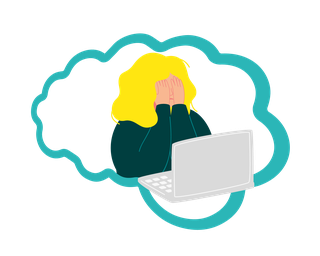
If you are staying at home, it might feel tempting to spend lot of time scrolling through social media and the news.
If this leads to difficult feelings, try to avoid paying attention to things that makes you feel worried or left out – focus on positive distractions instead.
Always use trustworthy sources – such as GOV.UK or the NHS website – and fact-check information from the news, social media or other people.
Positive News
If you like staying up to date with current affairs but negative news articles are making you feel anxious, try searching for good news. There are plenty of good news stories out there that can help you feel positive. Try reading articles on the good news network or following positive news uk on instagram.
Positive Distractions
If avoiding the news completely is best for you, trying having some positive distractions! The charity Mind suggests doing practical activities to distract yourself, such as writing, crafting, or playing music. Check out their suggestions for more positive distractions here.
Carry on doing things you enjoy
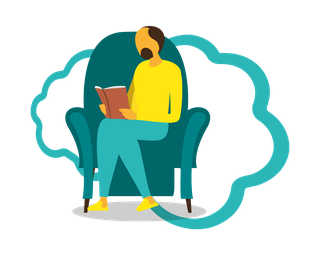
If you are self-isolating it may be easy to neglect the things you usually enjoy doing, but this can lead to feeling bored, frustrated or low.
Make an effort to focus on your favourite hobby if it's something you can still do at home. Or give something new a go: read, write, do crosswords or jigsaws, bake, or try drawing and painting. Whatever it is, find something that works for you.
If you cannot think of anything you like doing, try learning something new at home. There are lots of free tutorials and courses online.
Take time to relax
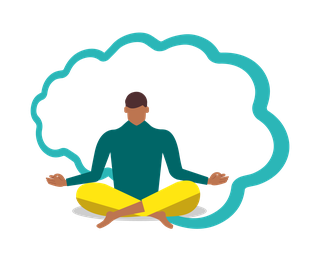
Taking time to relax is really important to wellbeing, it prevents us getting burnt out, and can help us deal with difficult emotions and worries.
If you're stressed, worried, or anxious, practicing relaxation techniques can give you a mental break from these feelings and help you refocus.
How to relax
The mental health charity Mind1 suggests the follow techniques to help you relax.
Take a break
Relaxation doesn't need to take up loads of time. You only need a few minutes, try stepping away from something stressful or taking time away from your normal routines and thoughts for a couple of minutes. That short time can give you enough space and distance to feel calmer.
- Read a book or a magazine, even if it's only for a few minutes.
- Run yourself a bath, watch a film, play with a pet or try out a new recipe.
Try Active Relaxation
Relaxation doesn't mean you have to stay still, doing gentle exercises can help you relax too.
- Take a walk, going at your own pace. You might choose to go for a longer walk, but even a few minutes of walking can help you feel relaxed. If you're looking for inspiration on where to go, there are many places listed on our site map that you can visit.
- Look for a class you'd like to try, such as yoga, Pilates or gentle stretching.
- Try some seated exercises, which you may be able to fit into your day more easily if you are busy. NHS have examples of seated exercises here.
Focus on your breathing
Learning to breathe more deeply can help you feel a lot calmer. It takes just a few minutes and can be done anywhere.
- Breathe in through your nose and out through your mouth. Try to keep your shoulders down and relaxed, and place your hand on your stomach – it should rise as you breathe in and fall as you breathe out.
- Count as you breathe. Start by counting to four as you breathe in and to four as you breathe out. Try to work out what's comfortable for you.
You can find more about breathing exercises on the NHS website.
Get Creative
Getting in touch with your artistic side can help you feel more calm and relaxed.
- Try painting, drawing, making crafts, playing a musical instrument, dancing, baking or sewing.
- Try not to worry too much about the finished product. Just focus on enjoying yourself.
Spend time in nature
Spending time outside and in green spaces can be great for your physical and mental health.
- Take a walk in a green space if you can, taking time to notice any trees, flowers, plants and animals you see on the way.
- Spend some time taking part in conservation, whether that's digging in your own garden or taking part in a local green project
Find out more about how to connect with nature here.
Picture yourself somewhere serene
Even if you can't physically get away, your imagination can transport you to somewhere you feel calm.
- Think of somewhere relaxing and peaceful. You might choose a memory of somewhere you've been, or a place you have imagined.
- Close your eyes, and think about the details of this place. What does it look like? What kind of colours and shapes can you see? Can you hear any sounds? Is it warm or cool? Let your mind drift and your body relax.
Listen to music
Music can relax you, connect you to your emotions and distract you from worrying thoughts.
- Listen to your favourite songs. You could dance or sing along, or just close your eyes and enjoy.
- Really listen to the music. Can you pick out different instruments? Can you hear a drum beat or a certain rhythm? Focus on the music, and let other thoughts fade away.
Do a tech check
Technology can be great for helping you feel connected, but if you're using it a lot then it can contribute to making you feel busy and stressed. Taking a break can help you relax, even if it is only short.
- Try turning your phone off for an hour, if you can.
- Step away from the TV, or have an evening where you don't check emails or social networks. Use the time to do something relaxing. You could try some of the ideas above
Get good sleep
Good-quality sleep makes a big difference to how we feel, so it's important to get enough. Good sleep improves your brain performance, mood, immune system, and mental health, and most adults need at least 7 hours of sleep every night to see the benefits. Try to maintain your regular sleeping pattern and stick to good sleep practices.
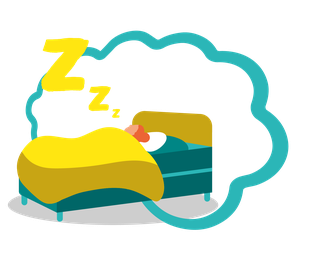
How to achieve good sleep
The first step to having good sleep is getting into a daily routine, as having a regular sleep pattern improves sleep quality.
Make a set bed-time routine, which starts before you get into bed. You should give yourself time to relax before trying to sleep. Avoid screens and try reading, journalling, or stretching instead of watching TV or working. Try sticking to a similar time when going to sleep every evening to better regulate your body clock.
Next it's important to prepare your body for sleep. Try to avoid having caffeine, alcohol, nicotine or a big meal too close to bedtime as it can stop you falling asleep and prevent deep sleep.
Regular exercise is also great for sleep. Just remember to steer clear of anything too vigorous right before bedtime if you find it affects your sleep,
The NHS also recommends creating a restful environment. It's generally easier to drop off when it's cool, dark and quiet – but the right sleep environment is personal, so try different things and see what works for you.
Wearing earplugs, putting your phone on silent and face down (or out of the room entirely), keeping clocks out of view and making sure the room is well ventilated can all make a big difference.
Some people also find playing ambient sounds like rainfall, gentle music or white noise helpful.
Be smart about napping. Napping can be a great way to catch up on lost sleep, but if you tend to find it difficult to fall asleep or staying asleep, napping can make things worse. Limit naps to 15 to 20 minutes in the early afternoon.1

